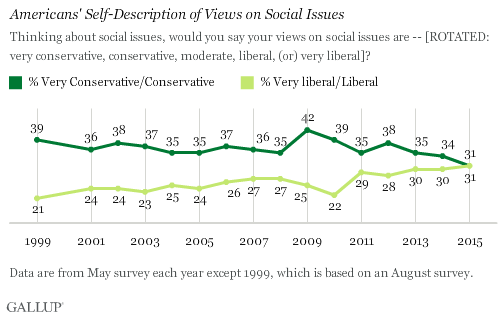Gallup recently released the results of a poll that suggest that Americans are becoming more liberal in their social views and, for the first time since 1999, the numbers who self-identify as liberal has matched the number who self-identify as conservative.
Of course, there is one obvious problem with surveys in which people self-identify themselves as liberal or conservative and that is than rather than arriving at their conclusion by examining their views on specific topics, they may be judging based on the perception of their location on the political spectrum. And modern day conservatism in the US has been completely hijacked by a very vocal and extreme alliance of religious, anti-science, pro-oligarchic interests. It may be that people’s views have not become objectively more liberal but that these vocal conservatives have become so extreme that positions that used to be considered conservative are now considered moderate and those that were considered moderate are now viewed as liberal.
But even allowing for that possibility, this change is a good sign. Conservatives have got a lot of mileage for a long time by arguing that the US is essentially a center-right nation and thus government policies should reflect that. This belief has become entrenched among legislators and those in the media as well, and has been used to argue that liberal social polices are somehow less legitimate and go against ‘the will of the people’.
Researchers from UC Berkeley and the University of Michigan dug up some surprising results after posing the question: How much do lawmakers really know about their voters’ political views?
“Pick an American state legislator at random, and chances are that he or she will have massive misperceptions about district views on big-ticket issues, typically missing the mark by 15 percentage points,” David Broockman and Christopher Skovron wrote in a study for the Scholarly Strategy Network originally published in 2013.
To investigate the question, the duo surveyed thousands of state legislators and compared their perceptions of voters to people’s actual views, derived from a large body of public opinion data.
Their conclusion: “legislators usually believe their constituents are more conservative than they actually are.”On three issues — universal healthcare, same-sex marriage, and welfare — lawmakers’ assumptions about what their constituents believed were “15-20 percent more conservative, on average,” than the actual base of public support for such issues.
Most striking, both liberal and conservative lawmakers assume their voters are much further to the right than they actually are.
So the idea that people are more liberal now may be helpful in marginalizing the crazies who, aided by right wing TV and radio, have succeeded in persuading a lot of people that they are more numerous in US politics than is warranted.


As long as red state legislators can gerrymander electoral districts, conservatives will continue to be elected, regardless of how liberal the populace might be.
Al Dente’s point may also explain the misperception by elected officials that assume their own extreme views are reflected by a majority of their gerrymandered district, when the truth is that they were only elected by a tiny committed minority.